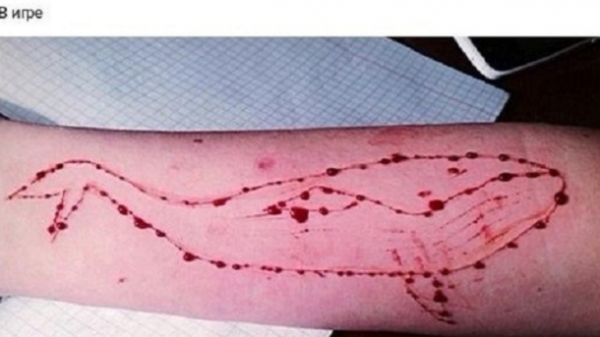
Panic is dangerous games on social networks, where Teens pushed to suicide, is growing every day. Two days ago, the police managed to save from suicide of the two girls from Kiev who were going to jump off the roof of high-rise buildings, completing the last mission of the game, “Blue whale” .
We will remind, the essence of the games that the teenager engages in some social media groups and performs at the command of the curator. Tasks are different and are almost always associated with injuries or danger – cut blade on the hand drawing, pass in front of a rushing train, to go by night to the abandoned room, etc. the Whole process is filmed (the criminals then sell these recordings to the thematic portals). The final order – to kill himself. Often, if the child refuses, the criminals calculate the IP address of the participant and tell him that this cowardice will have to answer to his family.
The names of the games (there are many more, these are the most popular):
“The blue whale”
“Whales swim up”
“Wake me up at 4:20”
f57 or f58
“A quiet house”
“Rina”
“Napoca”
“Sea of whales”
“50 days before my…”
Hashtags: #f53 #f57 #f58 #d28 #morenito #tihedam #chocoberry #mlecznych

THE PRESSURE POINTS
“Those who come up with these games, well versed in the psychology of adolescents, says a practicing psychologist Olga Perekopivka. They put pressure directly on the three pain points. First, take on poorly – many perform the job of criminals to prove to yourself and someone of your power. Second, they manipulate the children – the fear of losing family is stronger than fear of his own death. And third, they presented the suicide as an escape from all problems in life, help and relief.
Scammers know that the younger guys will talk about these games for adults. Those who are older, will include critical thinking and don’t believe criminals. But the students 5-7 class does not understand that the threat from the curators of the game, it is likely empty, and fear to carry out their orders.”
The psychologist notes that the popularity of this game indirectly blame the parents. “In Ukraine, the game came even before the New year. Many children talked about her parents, but they only waved, not taking their stories seriously. It is generally a big problem parents of teenagers – often they are so busy that we pay too little attention to the children. And they think, “Well, maybe if I die, then at least then they’ll notice me”. The risk involved in these games is especially great among children whose parents are in divorce or in a family there are other troubles.
Also the problem with many parents is that they taught children to think for themselves. They always decide everything and choose for them – and got a teenager who just can’t make decisions for himself. Many children begin to participate in the game with the thought “I’ll Try and throw” but not quit so easily, because to answer for their actions, no one taught.

HOW TO BEHAVE PARENTS: 7 TIPS
Ask the child a neutral question – say, I heard a that the now popular kind of game “Blue whale”. And listen to what the child will tell you. If he did not know about it – well (the main thing not to go into details so as not to Wake his curiosity). If he does, listen carefully to the story. If it’s full of details and parts, which are not written in the network, there is a risk that your child is already in the game. Also should be alerted if the son or daughter lead a story about a friend involved in the game – it’s likely that he’s lying and plays himself.
Makes no sense to say that these games are dangerous for teenagers it is no longer valid. Much better to say that they are being manipulated. For them is the revelation that the person who’s threatening their families, most likely, sick and lives in another city or even country. And its purpose is not to kill the parents and force the kid to do his will. Children, this is very sobering! Tell them that in manipulation being all – how many adults are carrying their life savings to fraudsters who phone them in the night and say that their loved ones are in trouble! Show your child that everything is vulnerable – it is very important to hear it from an authoritative adult.
The goal of your conversation is to teach the teenager to think critically and ask yourself about the purpose of a particular action, to think about everything that was happening to him.
Many parents in a panic, decide to establish total control over a child – to pick up the phone, lock the house etc this also makes no sense in the XXI century teenager, if you want, will always find a gadget and access to the network. The more you restrict, the more ways to circumvent the bans will be. Your task is not to control but to give support to a child came to you with a problem, and not hide it to the last.
Now more than ever important emotional connection with the child. Hug him more, tell that his age is also wrong, get involved in some kind of danger, and you helped some of the adults. Child it is important to understand that even his “perfect” parents, too, were wrong, and that’s okay, just as okay to ask for help. If you understand that now you do not perceive, ask him to speak with the adult who he trusted – school Counsellor, relative, etc.
Even if you are sure that your family are all well, extra vigilance will not prevent. Similar games – the case when the invasion of the private life of a son or daughter is justified. Browse their phones and pages in social networks – but only so that he didn’t know about it!
If you know that the child is still in the game, God forbid you to scold him. Show other emotions – cry, show how much you upset and as worried about him. Be sure to connect the dad in this situation, the man’s word is stronger than “mom”. In conversation with the daughter father need to find what to praise her, and with boys it is better to speak in the spirit of “let’s talk man to man, that we (we!) can do in this situation.” If no father, ask to talk to someone the child trusts – uncle, sister’s husband etc.

Psychologist Olga Perekopivka
Comments
comments











